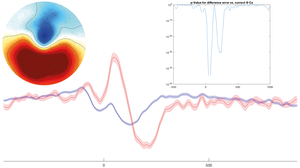Research
One focus of our group is the investigation of factors that contribute to the development of compulsive behaviors such as in addiction or obsessive-compulsive disorder. Using electrophysiological and imaging methods, we aim at identifying behavioral and neuronal biomarkers of compulsive behaviors, in the domains of action control, learning and decision making.
 © TU Dresden
© TU Dresden
Research Areas
Our group explores the behavioral and neuronal basics of substance disorders, obsessive-compulsive disorder, and the comorbidity of substance use and anxiety disorders. In the course of describing and exploring biomarkers and endophenotypes, we examine similarities and differences to other mental disorders, as well as underlying constructs such as compulsivity, impulsivity, and anxiety. Here you can find our publications. We are currently investigating the following projects and topics:
Regulation of Craving and Stress in Addiction: The regulation of craving, the strong desire for a substance, is an important prerequisite for the successful overcoming of addictions. The aim of this project is to investigate which neuronal networks are specifically activated for the regulation of craving for substances in smokers and how their activity is influenced by stress exposure. For this project Raoul Dieterich received a start-up financing.
Cognitive Control in Impulsivity and Compulsivity (PULS): In a additional project to the SFB 940, we received funding for the investigation of the relation between impulsivity and compulsivity with behavioral and neural correlates of cognitive control function.
Habitual, Model-free and Model-based Learning in Addiction: The ability to focus one's actions and decisions on a (longer term) goal is impaired in individuals with substance disorder and obsessive-compulsive disorder in favor of increased habitual responding. Currently, several paradigms are being developed and tested to explore these capabilities and the flexible use of these capabilities through EEG and fMRI. (Cooperation with Florian Schlagenhauf, Charité Berlin).
Electrophysiological correlates of approach and avoidance learning in obsessive-compulsive disorder: OCD is characterized by reduced flexibility in learning tasks. This project examines alterations in approach and avoidance learning and its neural correlates in OCD.
Performance monitoring: Performance monitoring are an essential requirement for flexible and adapted behavior. Changes in the behavioral and neural correlates of performance monitoring are evident in numerous mental disorders, so this could be a cross-diagnostic biomarker or even endophenotype.
Emotion-regulation and uncertainty in obsessive-compulsive disorder: Deficits in emotion processing and emotion regulation play an important role in most mental disorders. Together with Daniela Simon and Sandra Paul (HU Berlin), we have investigated the emotion regulation in OCD in a DFG project. In a current project, we investigate age-related changes in emotion regulation capacity and its EEG correlates.




